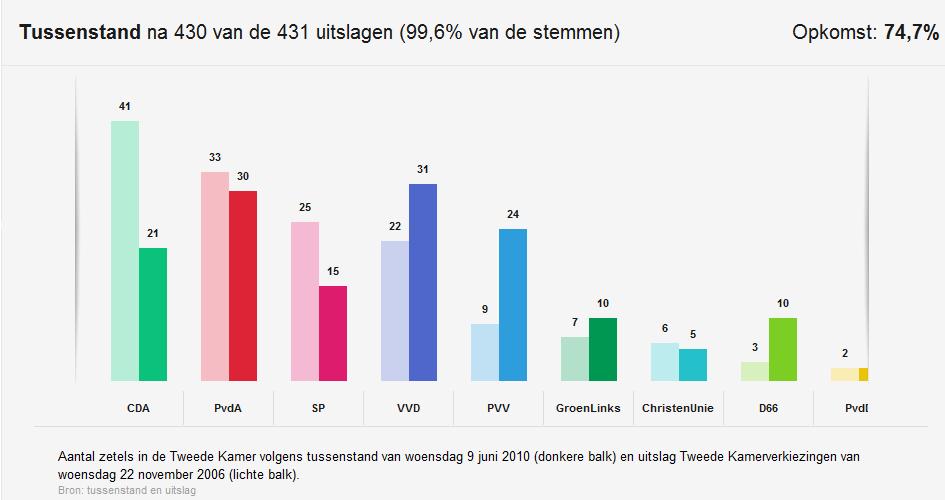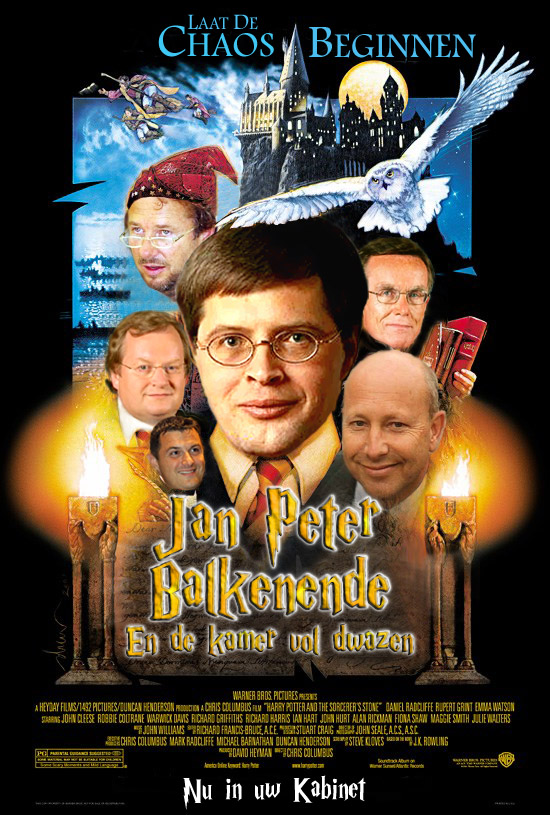
The graph above shows the end results of Wednesday’s parliamentary elections. Unlike what it looked like on the night itself, the right now does have a slim majority in parliament, which makes my on the night prediction that the most likely coalition will be a rightwing one look right. However, as we Dutch know, a lot of things can happen in the post-election coalition negotiations and it is by no means sure that we will end up with such a government.
In this context it was quite funny to see how stressed the English became last month when faced with a hung parliament and the prospect of a *gasp* coalition government. Where they were annoyed a new government took a week to form, we are skeptical that Mark Rutte’s promise of a new government before 1 July will be kept. If it is, Rutte will have played a strong part in it, as he’s the leader of the VVD, the rightwing party that for the first time in its existence emerged as the largest party in parliament. This however is not entirely due to the VVD’s own strength, but rather more to the extreme divide between voters. Traditionally we’ve had two to three big parties dividing most of the votes between them; now there are five or six, depending on your definition. The VVD therefore needed to win less seats to become the biggest.
Which also explains the difficulty Rutte or anybody else will have in forming a new government. Usually it’s possible to form a coalition with only two parties, or two big ones and a little one to make up the numbers. After this election however, at least three big parties are needed.
On the right, it would be natural for the VVD to go into coalition with the PVV, Wilders’ party, but will still need the CDA to make up the numbers, even if the CDA was the big loser of this election. Now the CDA has never been too embarassed by this sort of circumstances to not try and get into power, but with Balkenende gone and all the soul searching that such a loss brings with it, it’s anybody’s guess whether they will actually want to or like to sit this one out. It all depends on what they can get, obviously.
The other big question hanging over a rightwing coalition is the PVV’s relation with the VVD, of which Wilders used to be a member. There is some personal antagonism there, even if economically their politics are largely the same. Finally, there’s also the worry about how the PVV will hold up under the pressures of government — everybody is looking at what happened to the LPF, Pim Fortuyn’s party when they won the elections just after his assassination. Wilders has done a lot to ensure the problems the LPF had won’t happen to his party, but even before the elections some faultlines appeared and it’s the question whether he has done enough.
Moving on to the centre, it is also possible that there will be a coalition between CDA, PvdA and the VVD, but hardly likely considering the bad blood between CDA and PvdA and the exclusion of the PVV, which goes against the unwritten rules of Dutch coalition making. You don’t exclude such obvious winners, though that did happen to the SP in the 2006 elections. A PvdA, VVD and PVV coalition is the next option, though how sensible it would be for the PvdA to be wedged in between two rightwing parties is anybody’s guess. Let’s not even mention how much the PVV and PvdA are opposed to each other anyway. Last option here is a monster coalition with both PvdA and VVD, joined with left-liberal D66 and very christian-democrat CU, what’s called “Paars-Plus”, in recognition of the nineties VVD-PvdA-D66 governments.
Then there’s the leftwing. This is the most fractured part of the political spectrum, with the PvdA at thirty seats, the SP as second biggest with half that, followed by D66 and the green GroenLinks at ten each and finally the PvdD (the animal rights party) with two. They’re stuck at sixtyseven seats then, not enough to form a majority government and impossible to keep together anyway with so many parties. Not going to happen.
My money therefore is on a PVV-VVD-CDA coalition, which is going to be awful, as that would be a government where the CDa was the most leftwing party in it… It will mean a government united in its desire to enforce budget cuts and “liberalise” the economy further, demolishing the welfare state further. Even worse, all the Islamophobic rhetoric the PVV has engaged in now has a chance of becoming law, though both VVD and CDA would be likely to temper it somewhat. We won’t see the deportation of all Moroccan-Dutch people, but there will perhaps be laws against their religion and harassement of them. You don’t need sweeping changes in law to make the lives of a lot of people more miserable.
On a positive side, actually being in government may actually destroy the PVV LPF-style, or at least moderate them once it becomes clear it’s easier to shout than to govern. Best case scenario sees an implosion of the PVV followed by a collapse of the coalition, new elections and another roll of the dice..

